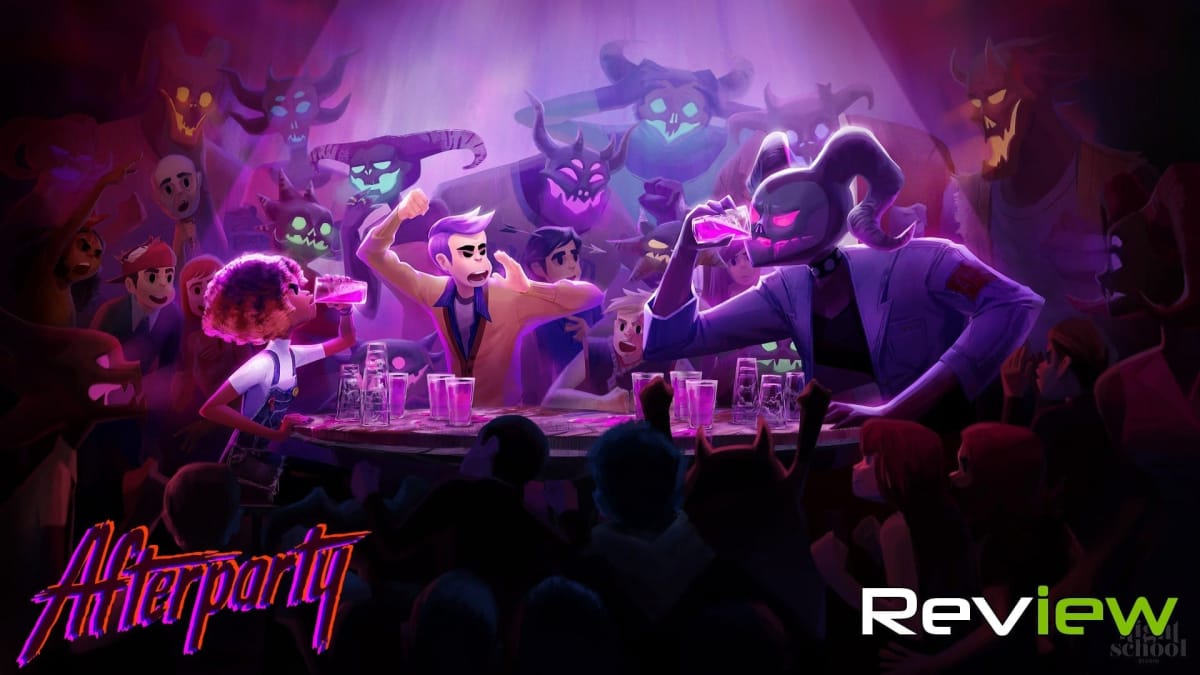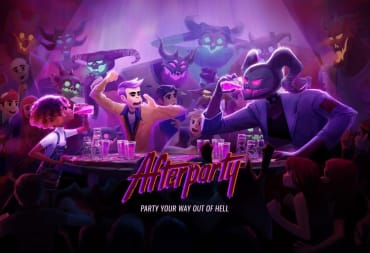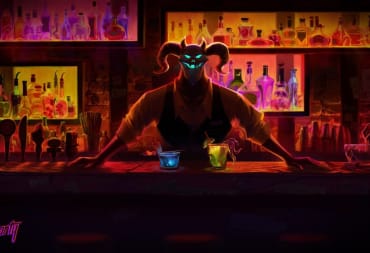Afterparty is a lot like a fruity cocktail. It's tasty and easy to love, with enough sweet flavor to make you ignore that little hint of bitterness that comes along for the ride. Most importantly though, it leaves you wanting another. The premise for Night School Studio's latest tells you a lot about the kind of ride you're in for. In Afterparty, you play as Milo and Lola, two best friends who find that they've suddenly and tragically died and gone to Hell. An eternity of physical and psychological torture awaits the pair, but there is one potential loophole. Rumor has it that anyone who can beat Satan himself in a drinking contest will earn their place back on Earth.
DOOM Afterparty: Welcome to Hell
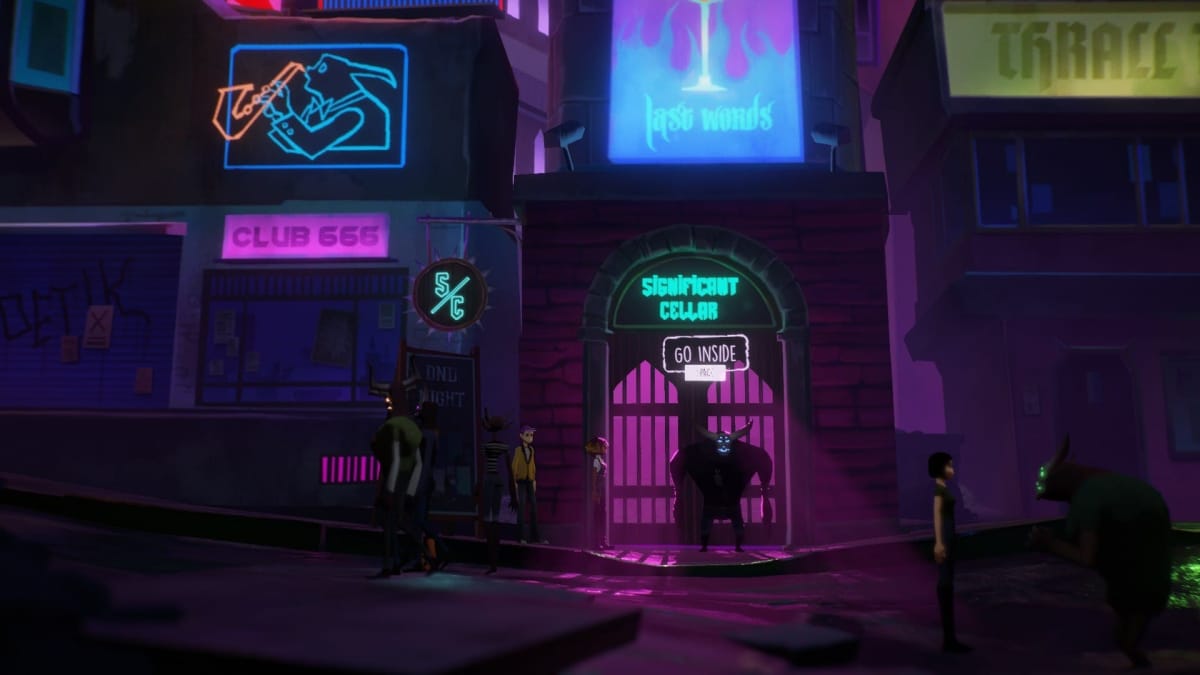
Afterparty's rendition of Hell is, humorously, not so different from Earth. Demons torture the souls of the damned from 9 to 6. Once work is over, human and demon alike head out to the local bars and cut loose. They play beer pong, go to dumpy concert venues, hook up, and post cheesy jokes on social media until the morning comes and everyone gets back to work flaying and whatnot. The narrative takes place over the course of one of those nights. Milo and Lola travel throughout the outer rims of Hell, hopping from bar to bar in search of a way to get into Satan's house party and finagle a seat at his table. The ultimate goal? Drinking the big man himself under the table.
Hell makes for an excellent backdrop to the story. Neon signs advertising bars and strip clubs, tortured souls hanging from trees delivering cheesy jokes, buddies bantering in the background, loners glowering as you walk by, gushing blood fountains. All of these little details add a nice touch of flavor to the environment. There is some backtracking through older areas, but the distance between locales is short enough for it to be a non-issue. Besides, it gives you a chance to see how the areas change over the course of the night. Lines outside of parties shorten, wild parties make way for bingo night, and people pass out drunk on the streets. In essence, despite being a land for the dead, Hell feels delightfully alive. And Afterparty's recurring gag about Hell being a lot like real life never gets old.
Afterparty's Writing Deserves a Spot in Heaven
Gameplay in Afterparty is mostly dialogue-based. You control either Milo or Lola—depending on the scenario—as they try to persuade, impress, intimidate, and boot-lick their way through Hell's ranks. The two main characters come with backstories and a good degree of personality, but there's enough wiggle room in their dialogue options to make them align closer with how you'd prefer them to be. In my first playthrough, I hammed up Milo's insecure and awkward tendencies while playing Lola as more of a cool, collected cynic. These decisions affect not just how they interact with the other characters in Hell, but also how they deal with each other. The narrative adapts to the growing dynamic you build between them.
It's in this dialogue that Afterparty shines the most. Characters' personalities are distinct and clear in their expression. Conversations between characters have a solid, natural flow that rarely feels forced or contrived. Aided by some stellar voice acting from the entire cast, the writing in Afterparty bounces between lore exposition, funny quips, key story beats, and character development so quickly and smoothly that I sometimes forgot it was time to pick a dialogue option. It's funny when it wants to be funny (which is often), sad when it wants to be sad, and awkward when it wants to be awkward.
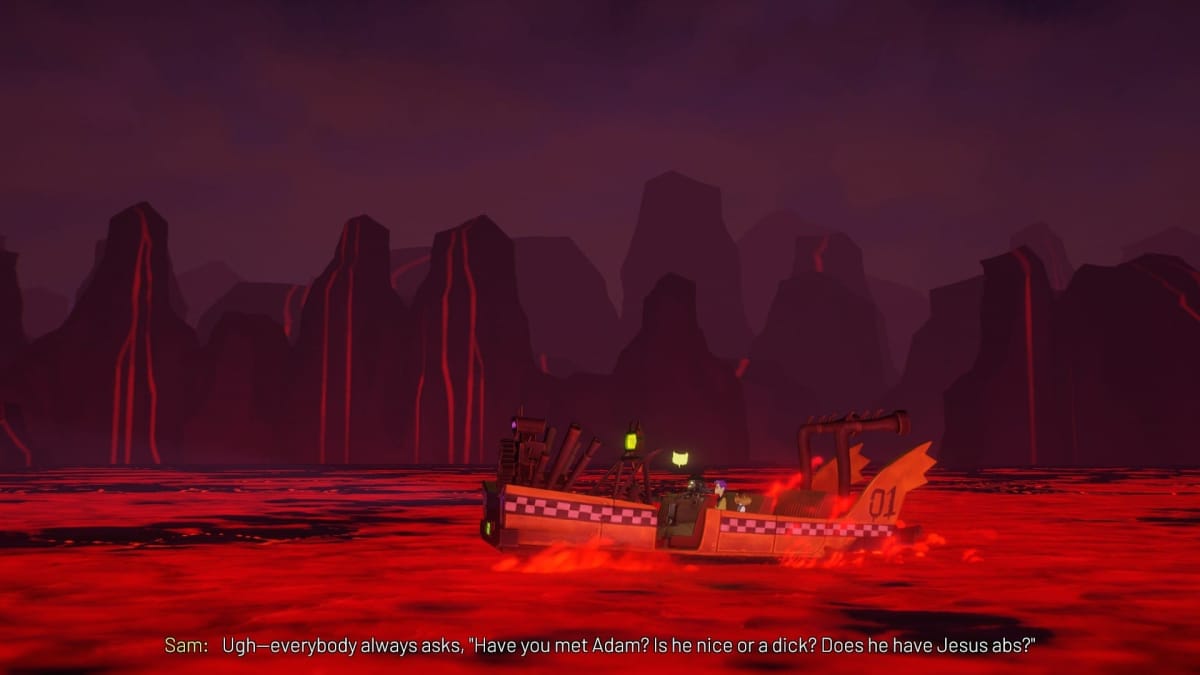
The only complaint I could come up with about the writing is that characters occasionally break the fourth wall. While this isn't necessarily a bad thing, Afterparty does such an excellent job of masking its tutorials, exposition, and other immersion-breaking beats behind its strong dialogue that it felt self-deprecating to break that immersion by directly addressing the player for no apparent reason. Even so, these moments are rare and the rest of the dialogue is rock solid so consistently that I couldn't begrudge the occasional slip.
Afterparty's Drinks: Bottoms Up! Then Down. You'll See What I Mean.
But talking can only get you so far in the game. Luckily, there's good ol' alcohol to help grease the wheels of conversation. Afterparty's drink system is both its most interesting spin on the narrative adventure genre and also its biggest weakness. Important conversations in Afterparty almost always occur near a bar, where you can stop and pick up a drink for your characters. There are several cocktails you can choose from and each one makes your character a specific kind of drunk, unlocking different dialogue options for them when they drink it. Famous Last Words, for example, makes you a punchy drunk who's more eager to pick fights. A different cocktail turns you into a tipsy flirt. Bluebeard's Last Wife, my personal favorite, just makes you talk like a pirate.
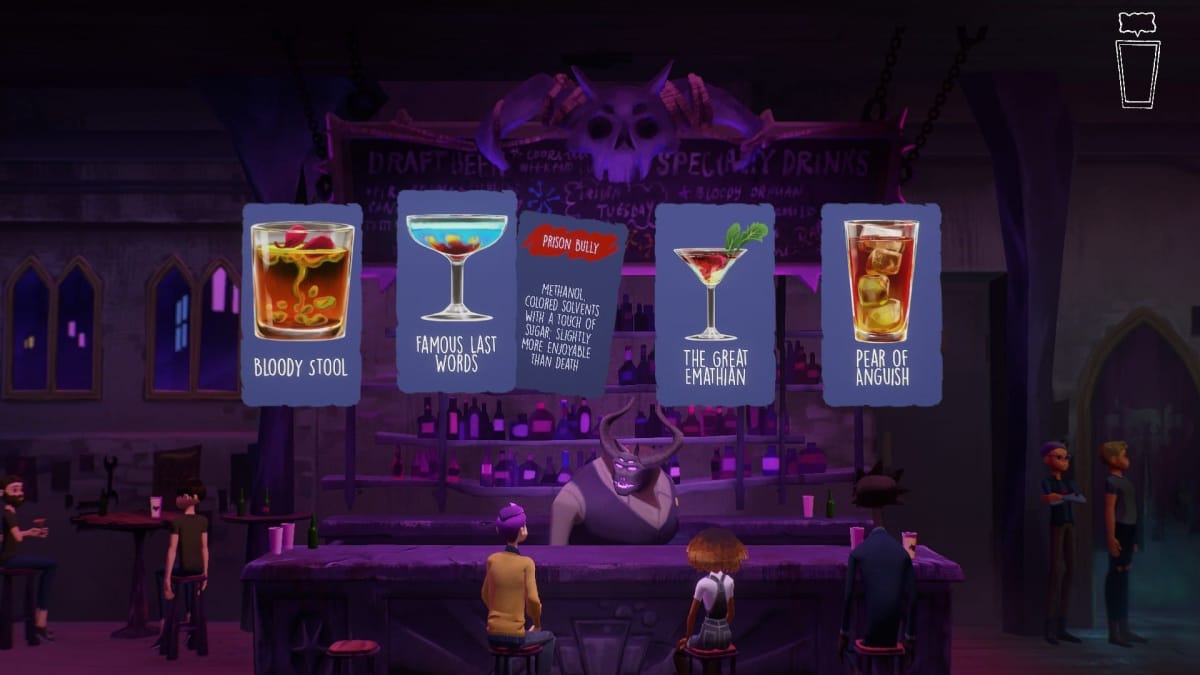
It's a unique and interesting mechanic that starts off with a lot of promise. An early scenario requires that you get past a bouncer to gain entry to a new area of the bar. One option is to use Famous Last Words to help you start a bar brawl to distract him. The other is to land yourself on the VIP list by beating someone in a beer pong game—a game made easier if you took the courageous drink and can trash talk him.
It's a promising start. As the story continues, however, the drink system slowly fades into the background, becoming less of an interesting puzzle-solving mechanic and more of a way to just spice up your dialogue options. I was able to stay sober through entire sections of the game without issue, and I found myself picking the drunk dialogue options not because they helped grease the conversational wheels, but just because they were funny. And although they never stopped being funny, Afterparty's drinks certainly felt underutilized by the end.
Afterparty Review | One Hell of a Night
But, like a night out with friends, it's all good as long as everyone had fun. And I certainly did. By the end of the six-or-so hour story, I was invested in the characters, touched by narrative's emotional beats, and had laughed out loud more times than I could count. The drink system felt like a missed opportunity, sure, but the intriguing setting, solid voice acting, and downright spectacular writing still made Afterparty a night to remember, and I look forward to whatever Night School Studio has brewing next.
TechRaptor reviewed Afterparty on PC via the Epic Games Store with a copy provided by the developer. The game is also available on Xbox One and PlayStatation 4.
Review Summary
Pros
- Writing is Top-Shelf Funny
- Solid Voice Acting From Whole Cast
- Hell Feels Alive
Cons
- Drink System Feels Underutilized
Have a tip, or want to point out something we missed? Leave a Comment or e-mail us at tips@techraptor.net
